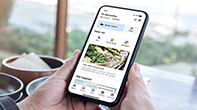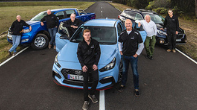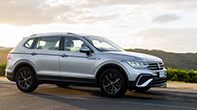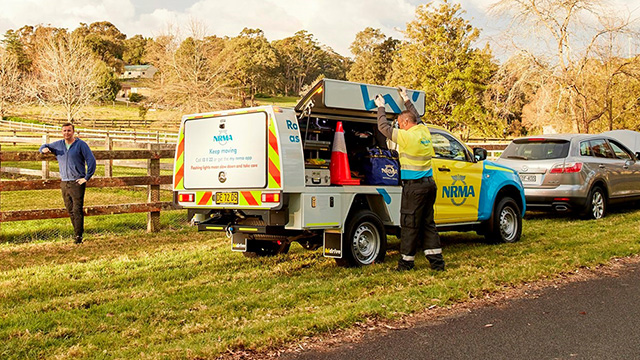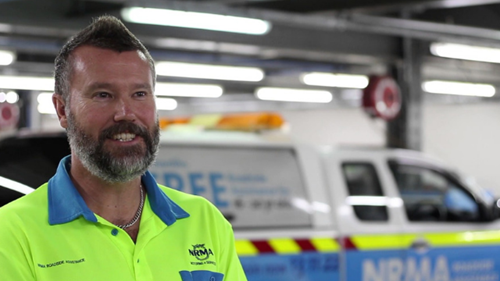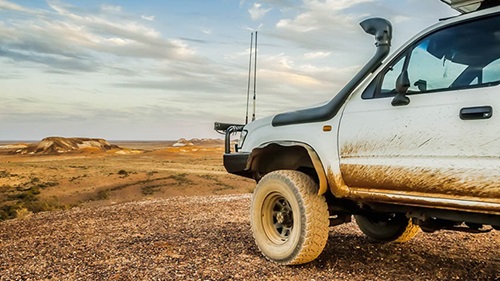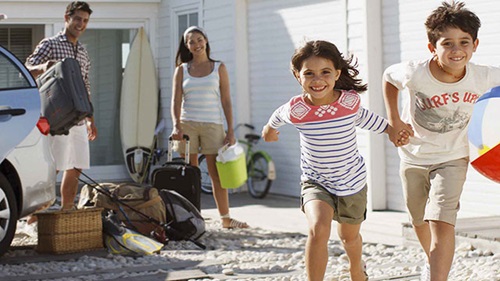There's never a good time or place for your car to break down. Whether it's a flat battery on a city road, a blown tyre on a regional motorway or engine failure out of nowhere, each scenario will present different challenges. In any case, it is vitally important to stay calm and put safety first.
Our patrols are trained to keep themselves, you and other motorists safe. However, between contacting the NRMA and a patrol’s arrival, these important tips can keep you out of harm’s way.
1. Be mindful of where you stop the car
Every breakdown is different. Some will result in the vehicle needing to stop almost immediately, while others may allow you to move the car somewhere safer, like a rest stop, a hard shoulder or a breakdown lane. Always move your car as far off the road as you can. If you have a flat tyre, drive to a safe spot away from the traffic, if possible.
If you break down suddenly, stay calm and use the vehicle's momentum to position the vehicle as far away from other traffic as possible if it is safe to do so.
2. Always activate your hazard lights
In any breakdown, make sure you switch on your hazard lights as soon as you stop. Hazard lights alert drivers to your vehicle and communicate the need for caution from other motorists. Don't use the radio or other non-essential features that might drain your battery.
In lower visibility situations, such as foggy weather or night time, activate your parking lights also.
3. To exit or not to exit?
Always focus on your surroundings, keep yourself safe and be aware of any changes to the environment around you. Ask yourself if there is a compelling safety reason to leave the vehicle. If you feel safest in the car, stay inside with the seatbelt fastened and call for roadside assistance.
If you decide it is safest to leave your vehicle, check thoroughly for traffic and exit from the side away from the road. Take your keys with you and leave the hazards on. Never cross a major road on-foot. Wait behind a roadside barrier away from your vehicle.
If you can't identify a safe place to wait outside the vehicle, stay inside with your seatbelt fastened and your doors and windows locked until your patrol arrives. Rest assured we always prioritise high-risk scenarios, so help is coming.
4. Calling for help
Once you are in a safe place, call 13 11 22 or book roadside through the my nrma app. If you aren't sure where you have broken down, scan your location to capture any landmarks, road signs, prominent buildings, road names and the direction of travel. Be prepared to share information about the number of passengers, road conditions, your vehicle type and the nature of the incident. It's a good idea to limit the use of your phone unless you need to use it for an emergency, as roadside assistance may be trying to contact you.
Be aware that roadside assistance could arrive in the form of a roadside patrol or a tow truck driver. Please listen to and take guidance from your patrol once they arrive as your safety is always our highest priority.
5. Don't change a tyre unless you are in a safe spot
Do not attempt to change a tyre unless you are sure it is safe to do so. Your NRMA patrol is trained to safely manage this kind of scenario so manage the risk and call 13 11 22 or use the my nrma app to book.
Changing the tyre on a vehicle requires its body to be lifted and supported with a jack. The only thing keeping the weight of your car from falling to the ground, or worse, onto your body, is this jack’s grip on the surface underneath.
Never attempt to change a tyre on uneven or slippery terrains such as gravel, as the jack can slip out from underneath the car. Furthermore, replacing a roadside tyre requires your body to be placed low and next to the vehicle, increasing your chance of not being seen by another motorist and seriously injured in the event of a collision.
6. Never open the bonnet or touch engine components
In the event of a breakdown, it is safest to turn the engine off and keep the car bonnet closed until professional help arrives. The car’s bonnet should remain closed, especially if engine overheating has caused the breakdown, as an overheated engine can cause considerable harm to those nearby. Even if overheating has not caused the issue, opening the bonnet could increase the risk of electrocution or exposure to flammable and skin-damaging fluids.
7. The dangers aren’t always traffic-related
Finding a safe place to wait for NRMA assistance does not just extend to avoiding a collision with another vehicle or injury from your own. If you feel personally unsafe for whatever reason while waiting for NRMA assistance, tell us and we can call the Police Assistance line to ensure the callout is marked as a priority and get to you as soon as possible.
8. Stay calm if you have children or pets in the vehicle
Keep calm and reassure your children and pets – it takes a little more care and attention, but it is possible to make everyone feel safe and assured. Ensure pets are safely restrained and keep your children in a safe location.
Only leave the vehicle if it's safe to do so and ensure your children don't exit the vehicle before you. Roll down the window or put on the aircon to keep the car cool. Having pets or children in the car during a breakdown is considered an emergency situation, so be assured your call out will be prioritised.
9. Be prepared for the worst
Symptoms usually precede breakdowns, such as strange noises or smells, a lack of power or change in the way the vehicle drivers, and dashboard warning lights. Drivers should monitor for these constantly and, if a symptom does appear, act sooner rather than later.
Pulling off the road into a service station or carpark before any problem with your car worsens could save you from an unnecessarily dangerous situation – and possibly a hefty repair bill!
While not all breakdowns present symptoms or are avoidable, a regularly serviced vehicle with roadside assistance is the best way to prepare for the worst. Drivers can also invest in satellite phones or HF radios if they drive through areas with little to no mobile coverage.

